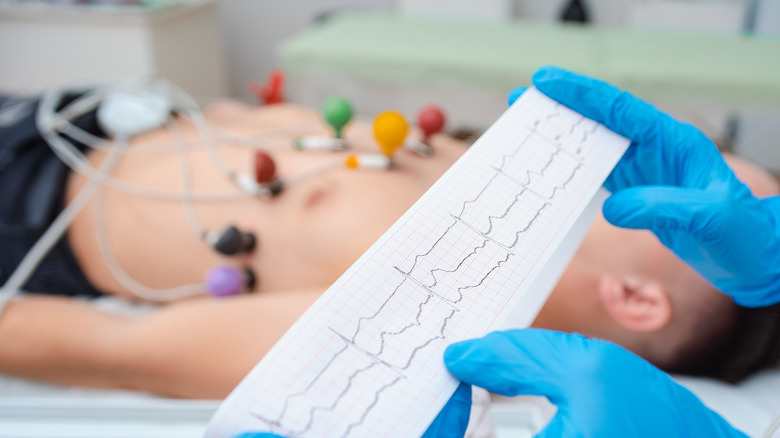What Is Atherosclerotic Cardiovascular Disease?
Atherosclerotic cardiovascular disease (also known as atherosclerosis) is a life-threatening condition characterized by the clogging of arteries with fatty substances called plaques, per the National Health Services (NHS). According to a 2022 review published in the journal StatPearls, the condition is behind about 50% of all fatalities in Westernized societies. It can affect the peripheral, carotid, renal, and coronary arteries, per Stanford Medicine. Because peripheral arteries supply blood to the legs and arms, atherosclerosis often leads to numbness in those areas. In the carotid and renal arteries, atherosclerosis symptoms may include fatigue, nausea, and breathing difficulties, while causing angina and arrhythmia in the coronary arteries.
According to the NHS, many people with the condition are initially asymptomatic, which makes diagnosing the condition difficult. When symptoms do appear, they develop gradually and may vary depending on the type of artery affected. Most often, the symptoms are similar to those symptoms associated with heart attacks and strokes if the condition affects the major artery.
Causes of atherosclerosis
As mentioned, atherosclerotic cardiovascular disease is characterized by a buildup of plaque along the walls of your arteries. This buildup usually affects the endothelium, a thin layer of cells around the arteries that keep the inside of your arteries in shape and facilitate blood flow, per WebMD. According to the source, plaque creates a bump made of bad cholesterol or LDL, which thickens and gets bigger, creating a blockage as the condition worsens. With time, this process continues throughout your body, undercutting your heart's regular functions and increasing susceptibility to stroke and other health problems.
According to a 2018 study published in the British Medical Journal, risk factors of atherosclerotic cardiovascular are characterized as modifiable and non-modifiable. Typical examples of modifiable factors include lifestyle choices like smoking as well as underlying medical conditions like hypercholesterolemia, hypertension, and diabetes. Non-modifiable factors include biological sex and family history of premature cardiovascular diseases.
According to Healthline, you're more likely to develop the condition if your cholesterol levels are too high, if you consume unhealthy fats, drinks with added sugar, and foods high in salt. Furthermore, aging is another risk factor since it naturally affects the heart and blood vessels. As these organs stress to pump and receive blood, the arteries may stiffen and lose their elastic nature as you age, making it likely for plaque to build up.
Diagnosis and treatment of atherosclerosis
According to Cleveland Clinic, people with atherosclerosis may not experience signs until the artery is more than 70% blocked with plaque. That's often too late. At that stage, critical complications like a heart attack or stroke are imminent. During a diagnosis, your doctor might conduct a physical examination checking absent pulses or abnormal sounds in your arteries. They might also assess your medical history to understand your likelihood of developing the condition.
Other tests diagnostic methods include an electrocardiogram, coronary calcium scan, stress test, or heart imaging test (via the National Heart, Lung and Blood Institute). If atherosclerosis is confirmed, treatment usually focuses on managing symptoms and preventing more serious ones. As such, your doctor may advise you to make some adjustments in your daily life. According to Stanford Medicine, helpful lifestyle changes include eating healthily, regular exercise, and reducing smoking.
Regarding medications, doctors sometimes prescribe low-dose aspirin to prevent blood clots, per Harvard Medical School. People at risk of a heart attack may require angioplasty surgery to open blocked arteries or a coronary artery bypass to distribute blood to the obstruction. These surgical treatment options may also come to play if lifestyle choices and medications don't yield effective results.



